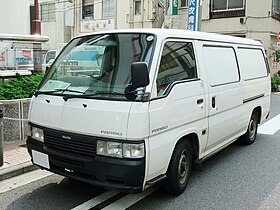Isuzu Fargo
| Isuzu Fargo | |
|---|---|
 |
|
| Overview | |
| Manufacturer | Isuzu |
| Production | 1980–2001 |
| Assembly | Fujisawa Plant, Fujisawa, Kanagawa, Japan |
| Body and chassis | |
| Body style | 2-door cab forward pickup 3-door van |
| Chronology | |
| Predecessor | Bedford CF (Europe and Australia) |
| Successor | Isuzu Como |
| First generation | |
|---|---|
 |
|
| Overview | |
| Also called | Bedford Midi Bedford Seta Chevrolet WFR General Motors Midi GME Midi Holden Shuttle Isuzu Midi Isuzu WFR Vauxhall Midi |
| Production | 1980–1995 |
| Assembly | Japan Tunisia: Kairouan(IMM) United Kingdom (Luton) |
| Body and chassis | |
| Body style | 2-door cab forward pickup 3-door van |
| Layout |
Front-engine, rear-wheel drive Front-engine, four-wheel drive |
| Powertrain | |
| Transmission | 4-speed manual transmission 5-speed manual transmission 3-speed automatic transmission 4-speed automatic transmission |
| Dimensions | |
| Wheelbase | SWB: 2,350 mm (93 in) LWB: 2,690 mm (106 in) |
| Length | SWB: 4,350 mm (171 in) LWB: 4,690 mm (185 in) |
| Width | 1,690 mm (67 in) |
| Height | Low roof: 1,950 mm (77 in) High roof: 2,185 mm (86.0 in) |
| Chronology | |
| Successor | Opel/Vauxhall Arena (GM models) |
| Second generation | |
|---|---|
 |
|
| Overview | |
| Manufacturer | Isuzu |
| Also called | Nissan Caravan |
| Production | 1995–2001 |
| Assembly | Japan |
| Body and chassis | |
| Body style | 3-door van |
The Isuzu Fargo is a commercial vehicle manufactured between 1980 and 2001 by Isuzu in Japan. The Fargo spanned two generations, the first of which was sold between 1980 and 1995 as both van and utility body styles, with the second generation, introduced in 1995 confined to a single van body style. This second generation was a badge engineered version of the Nissan Caravan (E24), as opposed to an Isuzu design.
Between 1982 and 1990 the first generation Fargo was marketed in Australia by Holden, the Australian subsidiary of General Motors as the Holden Shuttle. In Europe and New Zealand, the first series Isuzu Fargo was sold under the Isuzu WFR name. In Colombia, it was sold as the Chevrolet WFR. It was also built in the United Kingdom by Vauxhall Motors and sold as the Bedford Midi, then the Vauxhall Midi. Export versions of the Midi in Europe were badged Bedford Seta, General Motors Midi, GME Midi, and Isuzu Midi.
The first generation Isuzu Fargo was introduced in December 1980 with a 1.6- and 1.8-litre petrol engines, and a 1.8-litre diesel engine. A 2.0-litre diesel was also available, but originally only in the Wagon version. The commercial (van) version gained this option beginning in August 1981. Designed very much in the mould of contemporary Japanese vehicles of the time, it featured an underfloor engine.
The underpowered 1.8-litre options were dropped in March 1982, both replaced by 2.0-litre engines. In July 1982 the luxury-oriented nine-seater LS Wagon was introduced, featuring a standard sunroof among other features. At the same time, the column shifter was retired and a floor-mounted shifter became standard across the line. In November 1983 diesels became available with part-time four-wheel drive. In January 1984, turbo diesel engines were introduced in the Wagon LF model, followed by the addition of optional four-wheel drive on Wagons in November of that year.
In January 1986 the Fargo received a facelift, with changes to the headlights (now somewhat wider and with a more trapezoidal shape) and the instrument panel. One year later, in January 1987, automatic transmission became available on rear-wheel drive variants. In September 1987 the naturally aspirated diesel Wagons were discontinued, leaving only turbodiesels for these non-commercial versions. In October 1988 a cab-forward pickup (truck) body style was added.
...
Wikipedia
